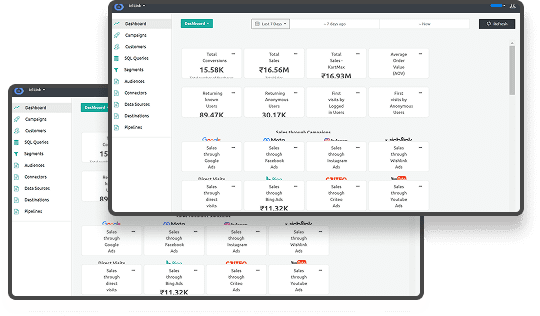"If cookies are crumbling under privacy laws, then let's whip up the perfect batch of cookieless tracking solutions!"
What is Cookieless Tracking? Why It Matters for Your Business
As privacy regulations tighten, businesses need new ways to collect user data without relying on traditional cookies. Cookieless tracking is a method that allows you to monitor user behavior and gather insights without placing third-party cookies on a user’s device. This approach focuses on using alternative techniques like server-side data collection and fingerprinting to ensure data accuracy while respecting user privacy.
The importance of cookieless tracking has grown due to increasing privacy concerns and regulations like GDPR and CCPA. As more browsers implement stricter cookie restrictions, businesses face challenges in gathering reliable data for marketing and analytics. By adopting cookieless methods, you can avoid relying on cookie consent banners, improve data accuracy, and maintain compliance with privacy laws, all while continuing to track valuable user interactions.
To start things off, let’s first explore the challenges associated with traditional cookie-based tracking and why businesses are shifting away from this method.
Challenges with Traditional Cookie-Based Tracking
Traditional cookie-based tracking is facing significant challenges as privacy regulations and user awareness increase. While cookies have long been the backbone of online data collection, they are becoming less effective due to restrictions and browser changes. This shift is pushing businesses toward cookieless tracking solutions to maintain accurate data collection.
- Privacy Concerns and Regulations:
Governments worldwide are implementing strict privacy laws, such as GDPR and CCPA, that limit the use of cookies. These regulations demand user consent for tracking, making cookie-based methods more complicated to manage.
- GDPR and CCPA enforce strict rules on data collection.
- Businesses must obtain explicit consent from users before setting cookies.
- Non-compliance can result in fines and penalties.
- Impact of Cookie Consent Banners:
Cookie consent banners create friction for users and reduce tracking effectiveness. Many users opt out of cookies, limiting the data available to businesses.
- Users often refuse to accept cookies due to privacy concerns.
- Reduced data leads to incomplete insights and less effective marketing strategies.
- Browser Restrictions:
Browsers like Safari and Firefox have introduced Intelligent Tracking Prevention (ITP) to block third-party cookies. Even Google Chrome has announced plans to phase out support for third-party cookies.
- Safari and Firefox block third-party cookies by default.
- Chrome is planning to phase out third-party cookies, compelling businesses to consider alternative tracking methods.
- Use of Ad Blockers:
Ad blockers prevent tracking scripts from running on websites, further reducing the effectiveness of cookie-based tracking.
- Ad blockers block cookies and scripts, limiting the amount of data collected.
- This results in less accurate targeting for marketing campaigns.
The growing limitations of cookie-based tracking make it essential to explore alternative solutions.
Now, let’s look into its methods that offer privacy-friendly and reliable options for data collection.
Cookieless Tracking Methods
As traditional cookies become less effective, businesses need to explore its tracking methods without it. These alternatives provide reliable data collection while respecting user privacy and meeting legal requirements.
- Server-Side Tracking
In server-side tracking, data is collected directly from your server instead of the user’s browser. This method allows you to bypass many browser restrictions on cookies.
- Data is sent from the server to analytics tools like Google Analytics, Adobe Analytics, etc.
- Works without relying on third-party cookies.
- Provides more control over data collection.
Learn more about it in this article from Ingest Labs which is one of its services.
- Browser Fingerprinting
Browser fingerprinting identifies users based on their browser’s unique configurations and settings. This technique creates a unique profile for each user without storing cookies.
- Uses details like screen size, fonts, and browser version.
- Helps track users even when cookies are blocked.
- Privacy concerns require careful handling to avoid regulation issues.
- Device Fingerprinting
Device fingerprinting tracks users by identifying the unique combination of hardware and software used on their devices. Like browser fingerprinting, it creates a user profile without storing cookies.
- Tracks devices based on operating system, browser, and hardware details.
- Helps businesses track users across devices.
- Requires caution to remain compliant with privacy laws.
Browser and device fingerprinting methods are being fast outdated. Apple’s App Tracking Transparency (ATT) and most browsers such as Apple Safari, Mozilla Firefox, Brave browser, etc implement anti-fingerprinting measures. Ingest Labs does not consider fingerprinting to be a legitimate way to track users and does not use any fingerprinting tools.
- Probabilistic Tracking
Probabilistic tracking uses statistical methods to predict user behavior and match users across different sessions. It does not rely on personal data but instead uses patterns and behaviors.
- Uses non-identifiable data to link users.
- Less accurate than deterministic methods, but more privacy-friendly.
- Useful in environments where strict privacy rules apply.
Ingest Labs with its advanced tracking methods, can help maximize your marketing ROI using advanced tracking techniques. These methods ensure businesses can continue to collect valuable data in a privacy-compliant way. As more restrictions continue to be rolled out by browsers and operating systems, the old way of deterministic tracking is being rendered irrelevant and has made way for probabilistic tracking.
Now that we understand its different methods of implementation, let’s explore its benefits and how they improve data collection.
Benefits of Cookieless Tracking
Cookieless tracking offers a range of advantages for businesses looking to collect data without relying on third-party cookies. These methods ensure compliance with privacy regulations while still delivering accurate insights.
- Accuracy
It improves data accuracy by relying on server-side methods and user behaviors rather than fragile cookies.
- Less likely to be blocked by browsers or ad blockers.
- Offers more reliable tracking, even in privacy-focused environments.
- Ensures better continuity in tracking user journeys.
Read about how Ingest Labs ensures that its accurate tracking over multiple channels can enhance your understanding of customer journeys.
- Privacy-Friendly Features
These methods respect user privacy by reducing reliance on personal data, making them ideal for compliant data collection.
- Minimizes the use of identifiable information.
- Helps businesses adhere to stricter privacy laws.
- Reduces the need for invasive tracking techniques.
- No Need for Cookie Consent Banners
Since these methods don’t rely on third-party cookies, businesses can often avoid the need for intrusive cookie consent banners.
- Simplifies the user experience by removing consent pop-ups.
- Improves user engagement by reducing interruptions.
- Reduces friction on landing pages and websites.
- GDPR Compliance
Cookieless tracking is designed to comply with GDPR and other global privacy laws, making it a future-proof solution for businesses. Enables compliant data collection without risking fines.
- Aligns with privacy regulations globally.
- Ensures users’ privacy is respected at all stages of data collection.
Learn how Ingest Labs can help you stay compliant with the GDPR.
By adopting these benefits, businesses can continue gathering meaningful data while respecting user privacy.
In the next section, let’s discuss how to implement these methods effectively.
Implementation of Cookieless Tracking Solutions
Implementing these methods requires a strategic approach to ensure smooth integration with your existing data and analytics tools. By using modern methods, you can continue tracking user interactions while staying compliant with privacy regulations.
- Server-Side Data Capture Methods
Server-side tracking captures data directly from your server, bypassing the need for client-side cookies.
- Data is collected from the server, offering greater control over user data.
- Works seamlessly with cookieless tracking solutions like fingerprinting and probabilistic tracking.
- Helps maintain data accuracy without browser restrictions.
Explore the benefits of server-side tracking offered by Ingest Labs. Ingest Labs Solutions provides server-side tracking and privacy-friendly methods.
- Integration with Marketing and Analytics Tools
For successful implementation, it’s important to integrate these solutions with existing marketing platforms.
- Connect your server-side tracking with Google Analytics or similar tools.
- Ensure seamless data flow between your tracking solutions and marketing platforms.
- Align a strong data collection strategy with solutions like Ingest Labs to pave way for accurate analytics.
With the right tools and integration, you can implement cookieless tracking effectively and maintain high data quality.
Hold up, it’s not over yet. We need to understand how these solutions impact data quality and marketing outcomes. So, let’s look into that next.
Impact on Data Quality and Marketing
Cookieless tracking has a significant impact on both data quality and marketing strategies. By shifting from traditional cookies to more privacy-friendly solutions, businesses can maintain accurate data while adapting to changing regulations.
Statistics about cookie user interfaces and tracking, broken down by region.
Let’s read about a few of these impacts:
- Influence on Data Accuracy
It offers improved data accuracy by eliminating issues related to cookie consent and browser restrictions.
- Ensures continuous tracking without the risk of blocked cookies.
- Server-side methods like the one provided by Ingest Labs provide more reliable data.
- Reduces gaps in tracking caused by ad blockers.
- Changes in Tracking User Behavior
With cookieless tracking, you can continue to monitor user interactions, but the method of data collection changes.
- Tracks users across sessions without relying on cookies.
- Utilizes techniques like fingerprinting and probabilistic methods to build user profiles.
- Helps businesses adapt to the loss of third-party cookies.
- Effects on Targeted Advertising
It influences the effectiveness of targeted ads by offering privacy-friendly solutions that still capture valuable data.
- Allows for accurate targeting without violating user privacy.
- Enhances ad campaigns by utilizing server-side data collection.
- Ensures that marketing efforts remain compliant with global privacy laws.
These changes help businesses maintain high data quality while adapting to modern tracking standards.
Now, let’s look into some real-world case studies and examples of successful cookieless tracking implementations.
Using First-Party Data for Cookieless Tracking
Several companies have shifted to using first-party data as a replacement for third-party cookies. Read how Ingest IQ implements first-party data in its functioning.
- First-party data collection improves accuracy while maintaining user trust.
- By relying on data gathered directly from users, companies avoid many of the limitations of cookie-based tracking.
- First-party data has become essential for businesses using cookieless tracking.
These case studies demonstrate the effectiveness of cookieless tracking in real-world applications.
As we wrap things up, let’s summarize the overall importance of adopting these solutions and explore future trends in data collection.
Conclusion
Cookieless tracking is becoming essential for businesses as privacy regulations and browser restrictions increase. By adopting cookieless tracking methods, you can maintain accurate data collection without relying on third-party cookies. These techniques not only improve compliance with laws like GDPR but also enhance user trust by respecting privacy.
Ingest Labs offers advanced solutions to help you implement cookieless tracking seamlessly. Whether you need server-side data capture or privacy-friendly analytics tools, Ingest Labs provides the expertise you need. Ready to future-proof your data collection strategy? Contact Ingest Labs today to get started.





